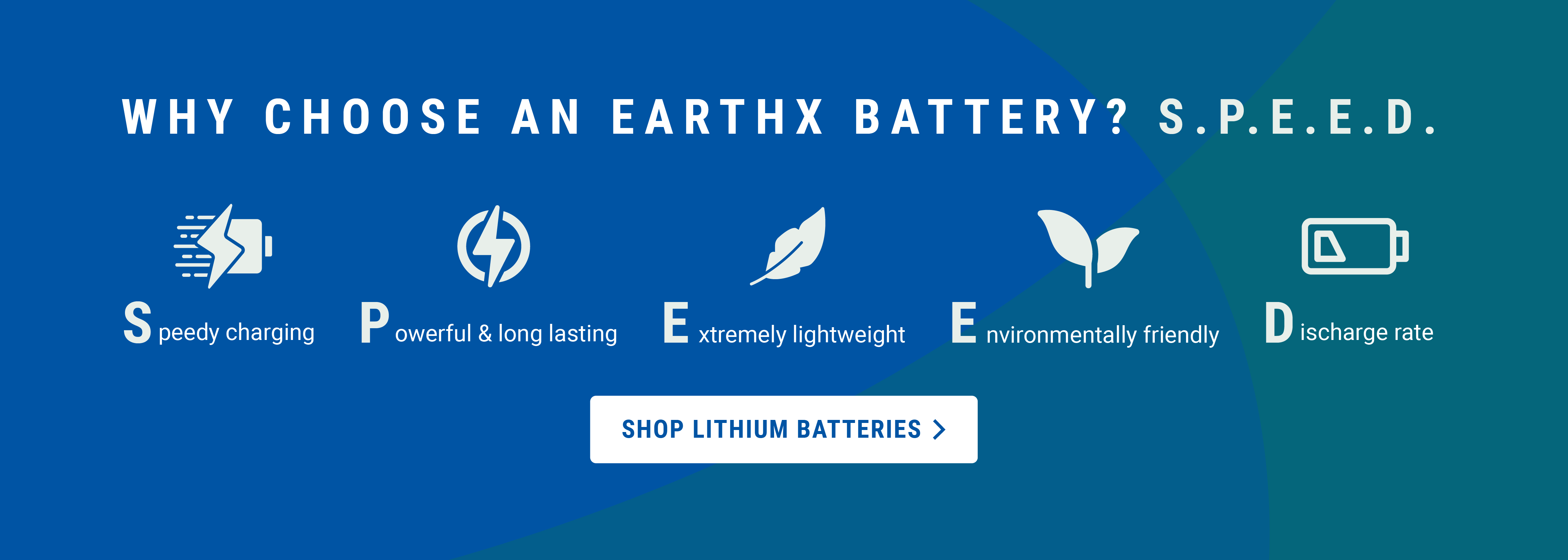EarthX Lithium Battery Technology
American engineering
Not all lithium batteries are equal, there are dozens of different types of chemistry used in lithium batteries. The EarthX batteries use cells made of Lithium Iron Phosphate (LiFePO4) chemistry that was developed in the U.S.A. This chemistry is the highest performance, most robust and the safest on the market today.
Lithium batteries are fundamentally different than lead-acid batteries. The lithium cells inside the battery need electronics to monitor and balance the voltage/charge of the individual cells. Other companies sell a balancing charger, which you have to plugin periodically to “top off” and balance the cells. Inside every one of the ETX-Series batteries is a microprocessor Battery Management System (BMS) that monitors the charge level of each cell and balances the charge when needed, protecting the cells from overcharge or over-discharge. What this means for you is more starting power, longer battery life, and the safest lithium battery on the market. All types of lithium batteries (not just ours) require a “BMS” that monitors and balances the cell charge and protect from over discharge or over charge.
BMS Features
*Not included in the ETZ-Series
Why Choose an EarthX Battery? S. P. E. E. D.
- Speedy Charging: EarthX Batteries will charge 2-3x faster than a lead acid battery. No expensive balancing charger needed
- Powerful & Long Lasting: EarthX batteries crank your engine over easily and will improve your starting performance. The 12V series resting voltage is 13.3V compared to a lead acid which is only 12.6V. EarthX batteries also have a larger life span, up to 6 years.
- Extremely Lightweight: EarthX batteries are up to 80% lighter than their lead acid equivalents. Lighter weight = better performance.
- Environmentally Friendly: EarthX batteries are environmentally and user friendly. They are nonhazardous, nontoxic, and nonpoisonous. They will not sulfate, corrode, freeze, or boil over. They will never need water added and will never spill acid.
- Discharge Rate: EarthX batteries have a much slower discharge rate than a lead acid battery, the need to charge is greatly reduced.
Other features of EarthX batteries
- No special mounting direction – can be used on its side or even upside down
- All batteries are tested to industry standards (SAE, UL, CE)
- Flexible battery connection – batteries can be used in either left or right side polarity application. Option to connect battery leads directly to the vehicle
- EarthX uses American battery technology and the batteries are assembled, engineered, and designed in the US
- Longer storage life – up to 4000 charge/discharge cycles (~4-6 years), over 4 times the life of a lead-acid battery
- Wide operating temperature range (-30°C to +60°C) – lithium batteries are dry cell technology and will not freeze, boil, sulfate, or corrode

